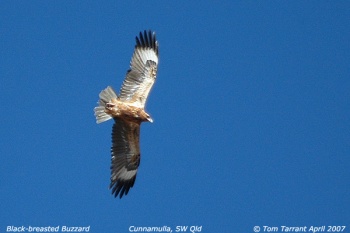(Profile link) |
(User template. Flight photo uploaded. Attempt to clean up copied text) |
||
| Line 1: | Line 1: | ||
| − | |||
'''Alternative name: Black-breasted Kite''' | '''Alternative name: Black-breasted Kite''' | ||
| + | [[Image:Black-breasted_Buzzard.jpg|thumb|550px|right|Photo by [http://www.birdforum.net/member.php?u=16212 Mat & Cathy]<br />Photographed near Wyndham, northern WA, [[Australia]]]] | ||
;[[: Category:Hamirostra|Hamirostra]] melanosternon | ;[[: Category:Hamirostra|Hamirostra]] melanosternon | ||
==Identification== | ==Identification== | ||
| − | + | *Tail: very short and square-tipped tail | |
| + | *Long nape feathers may be raised to form a short crest | ||
| + | *White under-wing patches | ||
| + | *Sandy brown breast in light-phase birds or dark brown and black in the dark-phase | ||
| + | '''Females''' are larger than males. | ||
==Distribution== | ==Distribution== | ||
| + | [[Image:168bbbz 0175.jpg|thumb|350px|right|Photo by {{user|Tom+Tarrant|Tom Tarrant}}<br />Photographed at Cunnamulla, SW [[Queensland]], [[Australia]]]] | ||
[[Australia]]: widely distributed but generally rare. Occurs throughout [[Northern Territory]] and most of [[Western Australia]] except the south-west corner, in the interior of [[South Australia]], most of [[Queensland]] and northern [[New South Wales]]. Commonest in the north of the country. Resident and nomadic. Vagrants recorded in [[Victoria]] and [[Tasmania]]. | [[Australia]]: widely distributed but generally rare. Occurs throughout [[Northern Territory]] and most of [[Western Australia]] except the south-west corner, in the interior of [[South Australia]], most of [[Queensland]] and northern [[New South Wales]]. Commonest in the north of the country. Resident and nomadic. Vagrants recorded in [[Victoria]] and [[Tasmania]]. | ||
==Taxonomy== | ==Taxonomy== | ||
| Line 12: | Line 17: | ||
Open woodland, grassland with scattered trees, scrubland and riverine woodland. | Open woodland, grassland with scattered trees, scrubland and riverine woodland. | ||
==Behaviour== | ==Behaviour== | ||
| + | ====Breeding==== | ||
The nest is a platform of large, dry sticks, with smaller sticks on top, placed in a tree along a waterway. The shallow saucer is lined with green leaves. 2 eggs are laid and both parents incubate, for about 40 days; both parents brood and feed the young which fledge after about 60 days. | The nest is a platform of large, dry sticks, with smaller sticks on top, placed in a tree along a waterway. The shallow saucer is lined with green leaves. 2 eggs are laid and both parents incubate, for about 40 days; both parents brood and feed the young which fledge after about 60 days. | ||
| − | + | ====Diet==== | |
The diet includes rabbits, large lizards, birds and carrion and the eggs of ground-nesting birds. | The diet includes rabbits, large lizards, birds and carrion and the eggs of ground-nesting birds. | ||
| + | ==References== | ||
| + | Birds in Backyards | ||
==External Links== | ==External Links== | ||
{{GSearch|Hamirostra+melanosternon}} | {{GSearch|Hamirostra+melanosternon}} | ||
*[http://www.aviceda.org/abid/birdimages.php?action=birdspecies&fid=42&bid=561 View more images of this species on the ABID] | *[http://www.aviceda.org/abid/birdimages.php?action=birdspecies&fid=42&bid=561 View more images of this species on the ABID] | ||
[[Category:Birds]][[Category:Hamirostra]] | [[Category:Birds]][[Category:Hamirostra]] | ||
Revision as of 23:40, 14 March 2009
Alternative name: Black-breasted Kite
- Hamirostra melanosternon
Identification
- Tail: very short and square-tipped tail
- Long nape feathers may be raised to form a short crest
- White under-wing patches
- Sandy brown breast in light-phase birds or dark brown and black in the dark-phase
Females are larger than males.
Distribution
Australia: widely distributed but generally rare. Occurs throughout Northern Territory and most of Western Australia except the south-west corner, in the interior of South Australia, most of Queensland and northern New South Wales. Commonest in the north of the country. Resident and nomadic. Vagrants recorded in Victoria and Tasmania.
Taxonomy
This is a monotypic species.
Habitat
Open woodland, grassland with scattered trees, scrubland and riverine woodland.
Behaviour
Breeding
The nest is a platform of large, dry sticks, with smaller sticks on top, placed in a tree along a waterway. The shallow saucer is lined with green leaves. 2 eggs are laid and both parents incubate, for about 40 days; both parents brood and feed the young which fledge after about 60 days.
Diet
The diet includes rabbits, large lizards, birds and carrion and the eggs of ground-nesting birds.
References
Birds in Backyards





